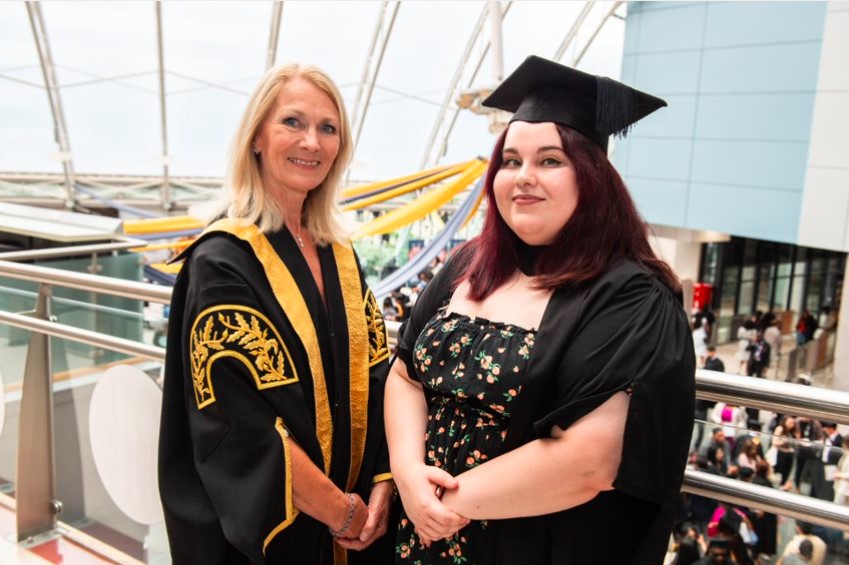Care leaver Aimee graduates despite all odds

In care at 16 and struggling through college with no motivation and low attendance, Aimee Brannan's future looked bleak.
Little did she know then that one of the reasons she found education difficult was because she was dyslexic.
This week, thanks to the right support, Aimee graduated with a degree in criminology from the University of Bradford and now she’s set to study for a Master’s.
Speaking after her graduation ceremony on Tuesday (July 18th), Aimee, 25, pictured below, said: “I'm just so happy. When I reflect on the last few years and all the time and effort I’ve put in, and how I’ve developed and matured, it’s really a massive thing.
“The support I’ve had from the University of Bradford has done wonders. Now I’m looking forward to progressing and seeing how far I can go.”

Aimee grew up in Bradford. By her own admission, she scraped through her GCSEs and reluctantly enrolled on a childcare course at college, at her mum's suggestion. But, at 16, a breakdown in her relationship with her parents led to Aimee going into care, living in council accommodation with other young people in similar situations.
Aimee said: “I started neglecting the important stuff. I wasn't going into college. My grades were dropping dramatically because of my low attendance. Living by myself was really difficult because that was the first time that I was alone.”
Foundation year
For the next five years, Aimee started various different college courses, without finding anything that grabbed her. She finally settled on health and social care, but still lacked motivation. It was her now fiancé, Michael, 30, who encouraged her to keep going to get a qualification.
Aimee said: “I look back on that time now and realise that was when I finally got my independence. I started cooking basic things and enjoying my own company. I felt I was doing something positive for myself with my college course, even though I knew it wasn’t something I wanted to go into for a career.”
Towards the end of the course, Aimee attended an Open Day at the University of Bradford in May 2019. Although she was immediately attracted to the criminology course, she feared her grades would not be good enough to get a place.
She said: “I was told that I would be able to enrol on a foundation year, which could then lead on to the criminology degree. This was really reassuring. I was also told I would have a lot of support at the university.”
As a member of the National Network for the Education of Care Leavers (NNECL), the University of Bradford champions opportunities for care experienced students to improve access to, success in, and progression from higher education. The University is also proud to be a signatory member of the Care Leavers Covenant, committed to providing additional support for care experienced students and helping them to live an independent life.
'Had I known I was dyslexic years ago, where could I have been now?'
Aimee passed her foundation year and did, indeed, get a place studying criminology. It was then that her personal tutor, Joanna Spink, suggested she should be screened for dyslexia and dyspraxia.
Aimee said: “Joanna told me I was doing really good work, but often the written pieces didn’t make sense. I couldn’t understand it because I always checked my work a few times and it made sense to me.
“The screening revealed that I actually have a very high level of dyslexia.
“I had gone through years of education needing support without realising. It wasn’t until I got into university where I found that support and my desire and prioritisation for education began.”
According to the British Dyslexia Association, up to 80 per cent of students with dyslexia leave school either without a diagnosis or the support to reach their full potential. Being diagnosed with dyslexia meant Aimee was given a special laptop and extra support at university which transformed her life.
Aimee, who graduated with a 2.1, said: “My grades went from 40-50 to 60-70, which was just amazing to me. It was such a big life-changing thing. It’s sobering to think, ‘Had I known I was dyslexic years ago, where could I be now?”
Aimee will be continuing in academia as she begins her master's degree in course this coming September at the University of Bradford.
